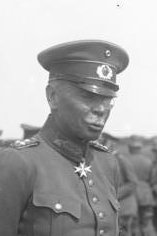“L'intelletto senza volontà è privo di valore, la volontà senza intelletto è pericolosa.”
citato in Liddell Hart, p. 39
Hans von Seeckt, nato Johannes Friedrich Leopold von Seeckt , è stato un generale tedesco.
Durante la Repubblica di Weimar fu capo di stato maggiore della Reichswehr dal 1919 al 1920 e comandante in capo dell'esercito tedesco dal 1920 fino al congedo avvenuto nell'ottobre del 1926, in un periodo nel quale si impegnò nella riorganizzazione dell'esercito appena uscito dalla prima guerra mondiale. Risalgono a questo periodo le più importanti decisioni in materia di dottrina tattica, organizzazione e addestramento militare per l'esercito tedesco e, quando nel 1926 von Seeckt fu collocato a riposo, la Reichswehr possedeva una chiara e standardizzata dottrina operativa, nonché una precisa teoria sul futuro modo di combattere, che influenzò notevolmente le campagne militari della Wehrmacht nel 1939 e 1940.
Wikipedia

“L'intelletto senza volontà è privo di valore, la volontà senza intelletto è pericolosa.”
citato in Liddell Hart, p. 39
citato in Liddel Hart, p. 39
Letter to von Kahr (2 November 1923), quoted in F. L. Carsten, The Reichswehr and Politics 1918 to 1933 (Oxford: Clarendon Press, 1966), p. 117.
Letter to General von Massow (31 January 1920), quoted in F. L. Carsten, The Reichswehr and Politics 1918 to 1933 (Oxford: Clarendon Press, 1966), pp. 67-68.
Letter to his sister (4 April 1926), quoted in F. L. Carsten, The Reichswehr and Politics 1918 to 1933 (Oxford: Clarendon Press, 1966), pp. 207-208.
Letter (4 February 1916), quoted in F. L. Carsten, The Reichswehr and Politics 1918 to 1933 (Oxford: Clarendon Press, 1966), p. 105.
Letter to Mrs Seeckt (9 September 1918), quoted in F. L. Carsten, The Reichswehr and Politics 1918 to 1933 (Oxford: Clarendon Press, 1966), pp. 105-106.
Letter to von Winterfedlt-Menkin (19 July 1915), quoted in F. L. Carsten, The Reichswehr and Politics 1918 to 1933 (Oxford: Clarendon Press, 1966), p. 105.
Letter to Mrs Seeckt (12 February 1919), quoted in F. L. Carsten, The Reichswehr and Politics 1918 to 1933 (Oxford: Clarendon Press, 1966), pp. 31-32.
Memorandum (4 February 1920), quoted in F. L. Carsten, The Reichswehr and Politics 1918 to 1933 (Oxford: Clarendon Press, 1966), p. 68.
“We were one in our aim; only our paths were different.”
Seeckt upon meeting Adolf Hitler for the first time (11 March 1923), quoted in John W. Wheeler-Bennett, The Nemesis of Power: The German Army in Politics 1918-1945 (London: Macmillan, 1964), p. 118, n. 1.